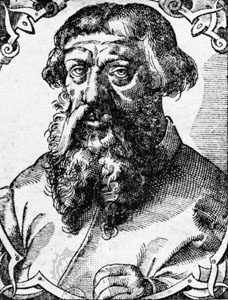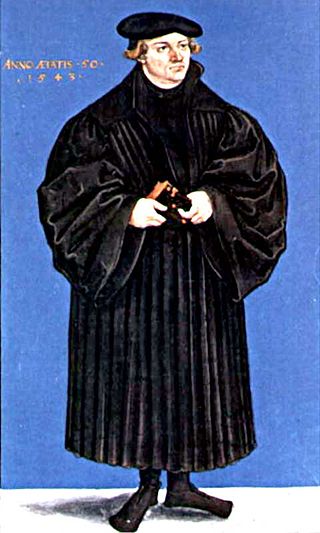Related Research Articles

Nicolaus von Amsdorf was a German Lutheran theologian and an early Protestant reformer. As bishop of Naumburg (1542–1546), he became the first Lutheran bishop in the Holy Roman Empire.

Year 1546 (MDXLVI) was a common year starting on Friday of the Julian calendar.
The Reformation, also known as the Protestant Reformation and the European Reformation, was a major theological movement or period or series of events in Western Christianity in 16th-century Northwestern Europe that posed a religious and political challenge to the papacy and the authority of the Catholic Church. Towards the end of the Renaissance, the Reformation marked the beginning of Protestantism and in turn resulted in a major schism within Western Christianity.

Étienne Dolet was a French scholar, translator and printer. He was a controversial figure throughout his lifetime, which was buffeted by the opposing forces of the Renaissance and the French Inquisition. His early attacks upon the Inquisition and the municipal authorities of Toulouse, together with his later publications in Lyon, caused the French Inquisition to monitor his activities closely. After several stays in prison, the combined efforts of the parlement of Paris, the Inquisition, and the theological faculty of the Sorbonne resulted in his conviction for heresy and a death sentence. He was hung and burned with his books on the Place Maubert in Paris. In modern times, Dolet is remembered as a martyr for what is now known as freedom of speech and freedom of the press.
This article contains information about the literary events and publications of 1688.
This article contains information about the literary events and publications of 1606.
This article contains information about the literary events and publications of 1563.
This article contains information about the literary events and publications of 1555.
This article contains information about the literary events and publications of 1520.
Crypto-Calvinism is a pejorative term describing a segment of those members of the Lutheran Church in Germany who were accused of secretly subscribing to Calvinist doctrine of the Eucharist in the decades immediately after the death of Martin Luther in 1546. It denotes what was seen as a hidden Calvinist belief, i.e., the doctrines of John Calvin, by members of the Lutheran Church. The term crypto-Calvinist in Lutheranism was preceded by terms Zwinglian and Sacramentarian. Also, Jansenism has been accused of crypto-Calvinism by Roman Catholics.

Philippe Desportes or Desports was a French poet.

Justus Jonas, the Elder, or simply Justus Jonas, was a German Lutheran theologian and reformer. He was a Jurist, Professor and Hymn writer. He is best known for his translations of the writings of Martin Luther and Philipp Melanchthon. He accompanied Martin Luther in his final moments.
Lutheran orthodoxy was an era in the history of Lutheranism, which began in 1580 from the writing of the Book of Concord and ended at the Age of Enlightenment. Lutheran orthodoxy was paralleled by similar eras in Calvinism and tridentine Roman Catholicism after the Counter-Reformation.

Martin Luther was a German priest, theologian, author, hymnwriter, professor, and Augustinian friar. Luther was the seminal figure of the Protestant Reformation, and his theological beliefs form the basis of Lutheranism. He is widely regarded as one of the most influential figures in Western and Christian history.
The decade of the 1530s in music involved some significant events, publications, compositions, births, and deaths.
Nationality words link to articles with information on the nation's poetry or literature.
Cyriakus Schneegass was a German Lutheran pastor, hymn writer, composer and music theorist.
This is a timeline of philosophy in 16th century.
List of events from the year 1509 in France.
Events from the year 1546 in France.
References
- 1 2 "Blessed Peter Faber", ucanews
- ↑ Memorias da Academia Real das Sciencias de Lisboa, Classe de Sciencias Moraes, Politicas e Bellas-Lettras (in Portuguese). A Academia. 1877. pp. 85–86.
- ↑ National Library of Wales (1989). Cylchgrawn Llyfrgell Genedlaethol Cymru: The National Library of Wales Journal (in Welsh). Council of the National Library of Wales. p. 118.
- ↑ Joseph A. Dane (1 January 2003). The Myth of Print Culture: Essays on Evidence, Textuality and Bibliographical Method. University of Toronto Press. p. 29. ISBN 978-0-8020-8775-1.
- ↑ Rossiter Johnson; Dora Knowlton Ranous (1906). The Literature of Italy, 1265-1907: Flamini, F. A history of Italian literature (1265-1907). National Alumni. p. 177.
- ↑ A. Schumann (1891). Allgemeine Deutsche Biographie / Schneegaß, Cyriacus (in German). Vol. 32. Historische Kommission bei der Bayerischen Akademie der Wissenschaften. pp. 92–96. Retrieved 22 June 2012.
- ↑ Jean Balsamo. Philippe Desports (1546-1606) Volume 62 of Actes et colloques. Editor, Contributor, Jean Balsamo. Publisher, Klincksieck, 2000
- ↑ sir Samuel Egerton Brydges (bart.) (1822). Res literariæ: bibliographical and critical, for Oct. 1820. p. 486.
- ↑ Rinaldina Russell (1994). Italian Women Writers: A Bio-bibliographical Sourcebook. Greenwood Publishing Group. p. 138. ISBN 978-0-313-28347-5.
- ↑ Robert Kolb (1 December 1999). Martin Luther as Prophet, Teacher, and Hero (Texts and Studies in Reformation and Post-Reformation Thought): Images of the Reformer, 1520-1620. Baker Books. p. 233. ISBN 978-1-4412-3720-0.
- ↑ Gross, Ernie. This Day in Religion. New York:Neal-Schuman, 1990. ISBN 1-55570-045-4
- ↑ This article incorporates text from a publication now in the public domain : Chisholm, Hugh, ed. (1911). "Dolet, Étienne". Encyclopædia Britannica . Vol. 8 (11th ed.). Cambridge University Press. pp. 387–388.